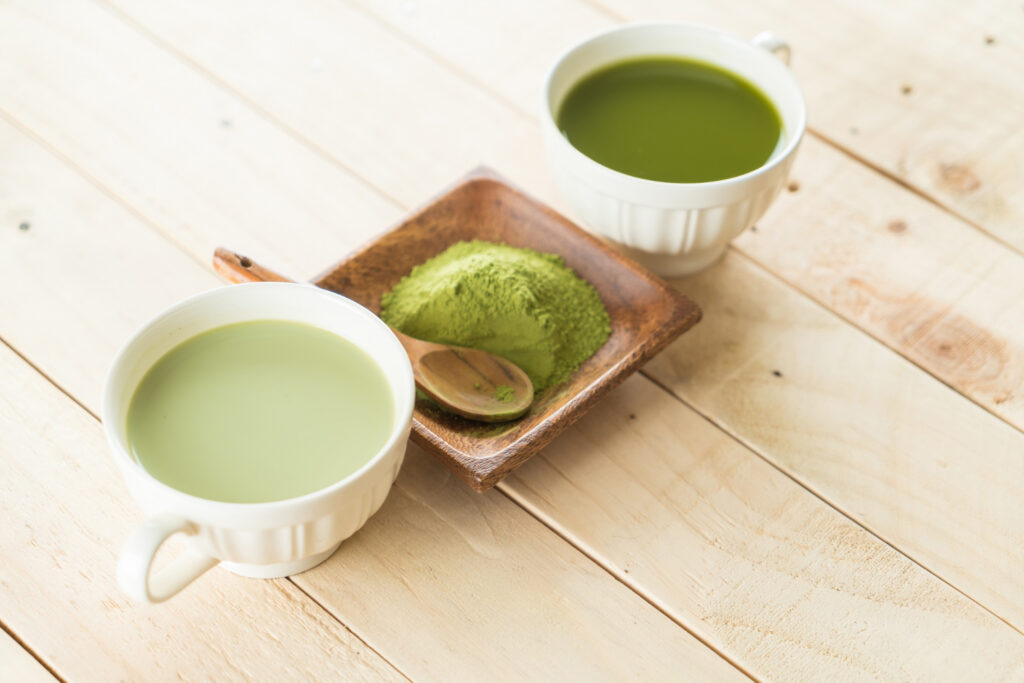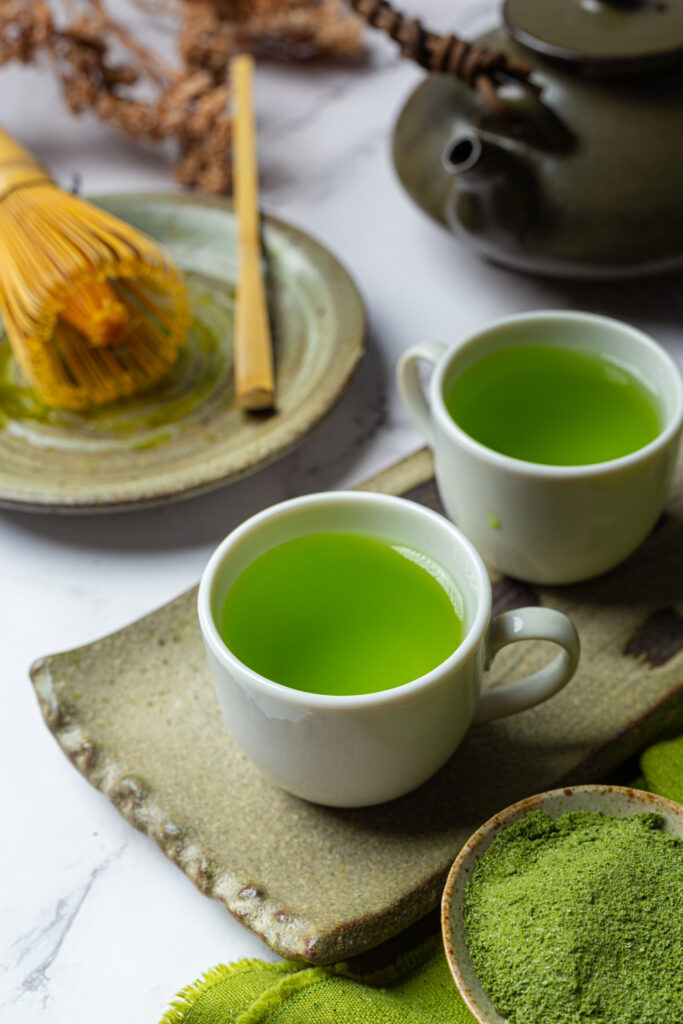In the hustle and bustle of today’s modern world, enhancing cognitive function is more important than ever. Matcha tea, a finely ground powder of specially grown and processed green tea leaves, is renowned for its exceptional health benefits. Rich in antioxidants, notably EGCG, matcha provides a sustained energy boost without the jitters of coffee. Moreover, studies show that matcha enhances focus, memory retention, and overall cognitive performance.
Section 1: What Makes Matcha Tea a Supercharged Brain Booster?

Matcha tea is celebrated not just for its vibrant green hue and unique flavor, but also for its profound impact on cognitive function. Unlike traditional green tea where leaves are steeped and discarded, matcha involves consuming the entire leaf in powdered form, ensuring maximum intake of its beneficial compounds.
Rich in Antioxidants
At the heart of matcha’s brain-boosting prowess lies its exceptional antioxidant profile, prominently featuring Epigallocatechin gallate (EGCG). EGCG is a potent catechin known for its ability to combat oxidative stress and inflammation, both of which can impair brain function over time. By neutralizing free radicals, EGCG supports neuronal health and enhances overall cognitive resilience.
Nutrient Density
Matcha tea is a nutritional powerhouse, densely packed with vitamins, minerals, and amino acids that contribute to brain health. It boasts significant amounts of vitamins A, C, E, and K, essential for maintaining neuronal integrity and supporting cognitive processes. Additionally, matcha is rich in L-theanine, an amino acid renowned for its calming effects on the brain, promoting a state of alert relaxation conducive to sustained focus and mental clarity.
Enhanced Caffeine Content and L-Theanine Synergy
Unlike other caffeinated beverages, matcha’s caffeine content is balanced by L-theanine, creating a synergistic effect that enhances cognitive performance without the jittery side effects commonly associated with coffee. L-theanine promotes alpha brain wave production, inducing a relaxed yet attentive mental state ideal for creative thinking and problem-solving.
Bioavailability and Absorption
The unique preparation method of matcha, which involves whisking the powdered tea in water rather than steeping, preserves its nutritional integrity and enhances bioavailability. This means the body can efficiently absorb and utilize matcha’s beneficial compounds, ensuring a consistent supply of nutrients essential for optimal brain function throughout the day.
Long-Term Brain Health Benefits
Regular consumption of matcha tea has been linked to long-term brain health benefits. Studies suggest that its antioxidant properties may help mitigate cognitive decline associated with aging, while its amino acid profile supports neurotransmitter balance critical for memory formation, learning, and mood regulation.
Section 2: The Science Behind Matcha Tea’s Brain-Boosting Powers
Understanding how matcha tea enhances cognitive function involves delving into its profound impact on brain chemistry and neural activity. Unlike other beverages, matcha’s unique composition and preparation method unleash a spectrum of benefits that support mental acuity and brain health.
Impact on Neurotransmitters
Matcha tea influences neurotransmitter activity in the brain, particularly dopamine and serotonin. These chemicals play pivotal roles in regulating mood, cognition, and emotional well-being. By modulating their levels, matcha promotes a sense of calm alertness and enhances concentration, making it an ideal choice for individuals seeking sustained mental clarity without the peaks and crashes associated with traditional stimulants.
Dopamine, often referred to as the “reward neurotransmitter,” is crucial for motivation, focus, and reinforcement of behavior. Serotonin, known as the “happiness neurotransmitter,” contributes to mood stabilization, emotional balance, and cognitive function. By supporting optimal levels of these neurotransmitters, matcha tea fosters a balanced mental state conducive to productivity and creativity.
Alpha Wave Production
One of matcha tea’s most distinctive benefits is its ability to promote alpha brain wave production. Alpha waves are associated with a relaxed yet alert mental state, often characterized by improved creativity, enhanced problem-solving abilities, and heightened cognitive performance. This phenomenon is attributed to the synergistic interplay between matcha’s caffeine content and its high concentration of L-theanine, an amino acid known for its calming effects on the brain.
Research suggests that the combination of caffeine and L-theanine in matcha induces alpha-wave activity more effectively than caffeine alone. This unique synergy results in a state of relaxed focus, where individuals experience heightened mental clarity and reduced stress levels. As a result, matcha tea is increasingly recognized as a natural cognitive enhancer that supports peak mental performance without the adverse side effects associated with traditional stimulants.
Neuroprotective Effects
Beyond its immediate cognitive benefits, matcha tea offers neuroprotective properties that safeguard brain health over the long term. The high levels of antioxidants, particularly EGCG (Epigallocatechin gallate), play a pivotal role in combating oxidative stress and inflammation in the brain. These processes are implicated in neurodegenerative diseases such as Alzheimer’s and Parkinson’s, making matcha a promising preventive measure against cognitive decline associated with aging.
EGCG’s ability to cross the blood-brain barrier enables it to directly interact with neural tissue, where it exerts its protective effects. By neutralizing free radicals and reducing inflammation, EGCG helps preserve neuronal integrity and function, thereby maintaining cognitive sharpness and memory retention well into old age.
Cognitive Performance Studies
Numerous studies have underscored matcha tea’s positive impact on cognitive performance across various demographic groups. Research participants consistently report improvements in attention span, information processing speed, and task performance following matcha consumption. These findings highlight matcha’s potential as a natural cognitive enhancer suitable for enhancing academic performance, professional productivity, and overall mental well-being.
Section 3: How to Maximize Matcha Tea’s Cognitive Benefits

To harness the full cognitive potential of matcha tea, it’s essential to adopt optimal preparation methods and incorporate complementary ingredients that enhance its bioavailability and efficacy.
Choosing the Right Matcha
The quality of matcha significantly impacts its cognitive benefits. Opt for ceremonial-grade matcha, which is derived from the youngest tea leaves and undergoes meticulous processing to preserve its vibrant green color and nutrient content. Ceremonial-grade matcha boasts a smoother, more delicate flavor profile and higher concentrations of beneficial compounds like L-theanine and antioxidants, ensuring maximum cognitive enhancement with each cup.
Proper Brewing Techniques
Mastering the art of matcha preparation involves more than simply mixing the powder with hot water. Use freshly boiled water that has cooled to around 175°F (80°C) to prevent scalding the delicate tea leaves and compromising their flavor and nutritional integrity. Whisk the matcha vigorously in a zigzag motion using a bamboo whisk (chasen) to achieve a frothy, velvety texture that enhances the tea’s flavor profile and ensures an even distribution of nutrients.
Enhancing Matcha with Brain-Boosting Additions
Incorporating complementary ingredients can amplify matcha tea’s cognitive benefits. For instance, adding a small amount of coconut oil or ghee to your matcha latte can enhance the bioavailability of fat-soluble nutrients like antioxidants and improve cognitive function. The medium-chain triglycerides (MCTs) found in coconut oil provide a sustainable source of energy for the brain, while ghee enriches matcha’s creamy texture and imparts a subtle nutty flavor.
Experimenting with Matcha Recipes
Embrace creativity by exploring diverse matcha recipes that cater to your taste preferences and cognitive needs. Blend matcha with almond milk and a touch of honey for a nourishing matcha smoothie that fuels morning productivity. Alternatively, infuse matcha into baked goods like matcha-infused cookies or muffins for a delightful treat that supports cognitive function throughout the day.
Incorporating Matcha into Daily Rituals
Establishing a consistent matcha ritual enhances its cognitive benefits by integrating mindfulness into your daily routine. Begin each morning with a ceremonial matcha tea ceremony, a centuries-old tradition that promotes tranquility and mental clarity. Take a moment to savor the rich aroma and earthy flavors of matcha while setting positive intentions for the day ahead, fostering a sense of focus and purpose.
Timing Matcha Consumption for Optimal Effectiveness
Strategically time your matcha consumption to align with periods of heightened cognitive demand. Enjoy a refreshing cup of matcha tea during mid-morning or mid-afternoon slumps to combat fatigue and regain mental alertness. The synergistic blend of caffeine and L-theanine in matcha promotes sustained energy levels without the crash associated with other caffeinated beverages, making it an ideal choice for maintaining peak cognitive performance throughout the day.
Section 4: Integrating Matcha Tea into Your Daily Routine
\
Incorporating matcha tea into your daily regimen can foster sustained cognitive enhancement and promote overall well-being. By embracing diverse consumption methods and mindful rituals, you can harness matcha’s revitalizing properties to support peak mental performance throughout the day.
Morning Rituals for Mental Clarity
Start your day with a revitalizing matcha tea ceremony, inspired by the ancient Japanese tradition of Chanoyu. Begin by selecting high-quality ceremonial grade matcha, renowned for its smooth texture and vibrant green color. Heat fresh water to approximately 175°F (80°C) and carefully whisk the matcha powder in a bowl using a bamboo whisk (chasen) until frothy.
Savor each sip mindfully while immersing yourself in the serene ambiance of your surroundings. Embrace the earthy aroma and delicate sweetness of matcha as you set positive intentions for the day ahead. This morning ritual not only enhances cognitive function but also cultivates a sense of tranquility and mindfulness that prepares you for productive endeavors.
Midday Pick-Me-Up Ideas
Combat midday fatigue and maintain mental alertness with a rejuvenating matcha latte or smoothie. Blend ceremonial-grade matcha with your choice of milk—such as almond, oat, or coconut—and a hint of natural sweetener like honey or maple syrup. The creamy texture and balanced flavor profile of matcha lattes provide a nourishing boost of antioxidants and sustained energy without the crash associated with coffee.
Alternatively, incorporate matcha into a refreshing green smoothie by combining it with spinach, banana, and a splash of citrus juice. This vibrant blend not only invigorates the senses but also replenishes essential nutrients that support cognitive function and overall vitality.
Evening Relaxation and Cognitive Recovery
Wind down in the evening with a soothing cup of matcha to promote relaxation and cognitive recovery. Opt for a decaffeinated or low-caffeine matcha variant, such as culinary grade matcha, to avoid disrupting sleep patterns. Prepare matcha using warm water and whisk it gently to create a calming beverage that soothes the mind and prepares the body for restorative sleep.
Enhance the relaxing properties of matcha by incorporating adaptogens like ashwagandha or chamomile into your evening blend. These natural botanicals help alleviate stress and promote a sense of calmness, facilitating deeper relaxation and mental rejuvenation as you prepare to unwind for the night.
Consistency and Mindful Consumption
Consistency is key to maximizing the cognitive benefits of matcha tea. Incorporate it into your daily routine as a nourishing ritual that supports mental clarity and overall well-being. Whether enjoyed as a morning ritual, midday pick-me-up, or evening relaxation aid, matcha tea offers a versatile solution to enhance cognitive function and promote holistic health throughout the day.
Section 5:Testimonials and Real-Life Experiences
Real-life testimonials highlight the transformative impact of matcha tea on cognitive performance and overall well-being. Individuals across diverse demographics have shared their experiences, revealing profound benefits that extend beyond mere refreshment.
Enhanced Focus and Mental Clarity
Many users report noticeable improvements in focus and mental clarity after integrating matcha tea into their daily routines. For instance, professionals in demanding industries, such as finance and technology, attest to enhanced concentration and productivity throughout the workday. The combination of matcha’s caffeine content and L-theanine promotes a state of alertness without the jittery effects associated with other caffeinated beverages, enabling sustained mental performance and decision-making prowess.
Sustainable Energy Boost
Matcha tea serves as a sustainable energy source that combats fatigue and supports endurance. Athletes and fitness enthusiasts incorporate matcha into their pre-workout routines to enhance physical performance and mental acuity. The gradual release of caffeine in matcha provides lasting energy without the rapid spikes and crashes typical of energy drinks, making it an ideal choice for maintaining peak performance during rigorous training sessions.
Mood Elevation and Stress Reduction
The calming effects of matcha’s L-theanine content contribute to mood stabilization and stress reduction. Users report a sense of relaxation and emotional balance, particularly during high-stress periods or challenging circumstances. Matcha’s ability to promote alpha brain wave production fosters a state of relaxed alertness, facilitating creative thinking and problem-solving abilities even under pressure.
Improved Cognitive Function Over Time
Long-term consumers of matcha tea often experience cumulative cognitive benefits that enhance memory retention and learning capacity. Students and academics incorporate matcha into their study routines to bolster cognitive function during exams and intensive study sessions. The antioxidant-rich profile of matcha supports neuronal health and may mitigate cognitive decline associated with aging, providing a proactive approach to maintaining brain vitality over the lifespan.
Expert Endorsements and Scientific Validation
Nutritionists and healthcare professionals endorse matcha tea as a valuable component of a balanced diet that promotes cognitive health and overall vitality. Scientific studies validate matcha’s cognitive-enhancing properties, highlighting its role in improving attention span, information processing speed, and cognitive flexibility across different age groups. The cumulative evidence underscores matcha tea’s efficacy as a natural cognitive enhancer that supports mental acuity and resilience.
Concluding Matcha’s Cognitive Benefits
In conclusion, matcha tea stands as a powerful ally in enhancing cognitive function and promoting overall well-being. Its rich antioxidant content, coupled with its ability to support neurotransmitter balance and alpha wave production, makes it a standout choice for those seeking to optimize brain performance naturally.
FAQs About Matcha Tea
Q1: How much matcha tea should I drink daily to experience cognitive benefits? A: It is recommended to consume 1-2 servings of matcha tea per day to reap its cognitive benefits effectively.
Q2: Can matcha tea replace coffee as a daily energy booster? A: Yes, matcha tea provides a sustained energy boost without the crash associated with coffee, making it an excellent alternative.
Q3: Are there any side effects of consuming matcha tea regularly? A: Matcha tea is generally safe when consumed in moderation. However, individuals sensitive to caffeine should monitor their intake to avoid potential side effects.
Q4: How should I store matcha tea to preserve its freshness and potency? A: Store matcha tea in an airtight container in a cool, dry place away from sunlight to maintain its flavor and nutritional properties.

